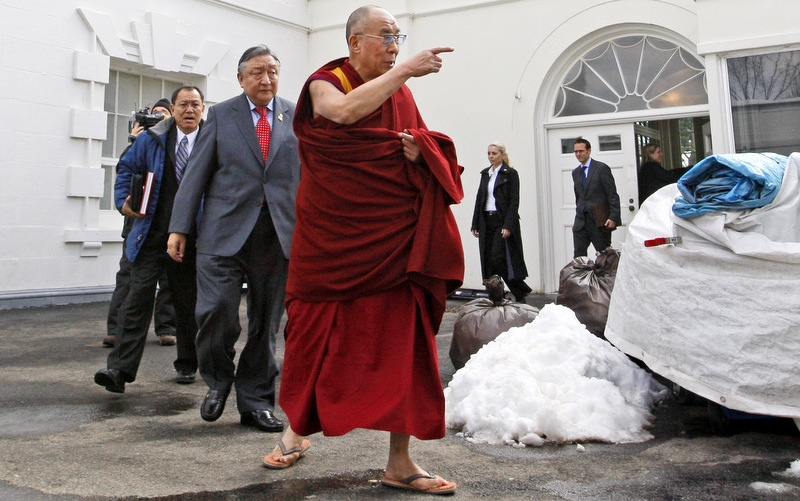
Chinese authorities tried to thwart a Friday meeting of President Barack Obama and the Dalai Lama, the exiled Tibetan spiritual leader, according to a statement from China’s foreign ministry.
However, the warning went unheeded by the White House, where the meeting was held to discuss concerns about China’s human rights practices.
“We are deeply concerned and have lodged solemn representations with the U.S. side,” according to a statement issued by China’s foreign ministry on Friday. “We must point out that Tibet-related affairs fall entirely within the internal affairs of China which allow no foreign interference. The Dalai Lama is a political exile who has long been engaged in anti-China separatist activities under the cloak of religion.
“By arranging a meeting between the President and the Dalai Lama, the U.S. side will grossly interfere in the internal affairs of China, seriously violate norms governing international relations and severely impair China-U.S. relations. China expresses firm opposition. We urge the U.S. to take China’s concerns seriously, immediately cancel the meeting, and not to provide facilitation and platform for the Dalai Lama to carry out anti-China separatist activities in the U.S.,” the statement concluded.
Chinese officials claim their policies toward Tibet are meant to improve life in the mountainous region. But officials routinely restrict access to foreign journalists and diplomats, among others, and communicating with Tibetan people is usually off limits.
The Dalai Lama has worked from his base in the Dharamsala, India, a mountainous area that borders China, since the failed 1959 Tibetan uprising. In 2011, he announced that he was giving up his role as political leader of Tibetans in exile.
According to White House spokeswoman Caitlin Hayden, Obama was meeting with the Dalai Lama “in his capacity as an internationally respected religious and cultural leader,” she said Thursday, The Los Angeles Times reported.
The U.S. has concerns about human rights abuses in the Tibetan areas of China.
“The United States supports the Dalai Lama’s ‘middle way’ approach of neither assimilation nor independence for Tibetans in China,” Hayden said, according to the Times. “We will continue to urge the Chinese government to resume dialogue with the Dalai Lama or his representatives, without preconditions, as a means to reduce tensions.”
The Times further noted that earlier this week, Zhu Weiqun, a top political aide to China’s central government, wrote a powerfully worded paper on a government website, Tibet.cn, “in which he said foreign leaders who meet the Dalai Lama should ‘pay a price.’ In time, he added, the West ‘will see the real face of the Dalai clique.’”
China took control of Tibet in 1950. Human rights groups claim that China violates the human rights of Tibetans and uses brutal means to enforce its rule.

